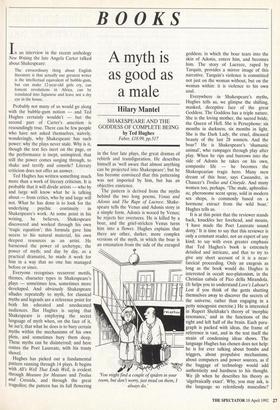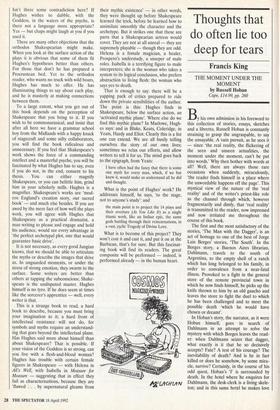BOOKS
A myth is as good as a male
Hilary Mantel
SHAKESPEARE AND THE GODDESS OF COMPLETE BEING by Ted Hughes Faber, f18.99, pp.5 17 In an interview in the recent anthology New Writing the late Angela Carter talked about Shakespeare:
The extraordinary thing about English literature is that actually our greatest writer is the intellectual equivalent of bubble-gum, but can make 12-year-old girls cry, can foment revolutions in Africa, can be translated into Japanese and leave not a dry eye in the house.
Probably not many of us would go along with the bubble-gum notion — and Ted Hughes certainly wouldn't — but the second part of Carter's assertion is resoundingly true. There can be few people who have not asked themselves, naively, wonderingly, why Shakespeare has such power: why the plays never stale. Why is it, though the text lies inert on the page, or the performance is inept, uninspired, that still the power comes surging through, to shake and terrify and console? Literary criticism does not offer an answer.
Ted Hughes has written something much more than a work of literary criticism. It is probable that it will divide artists — who by and large will know what he is talking about — from critics, who by and large will not. What he has done is to look for the underlying psychic continuity in Shakespeare's work. At some point in his writing, he believes, Shakespeare discovered and worked through his own `tragic equation'; this formula gave him access to his natural material, his own deepest resources as an artist. He harnessed the power of archetype, the power of myth; and day by day, as a practical dramatist, he made it work for him in a way that no one has managed before or since.
Everyone recognises recurrent motifs, themes, character types in Shakespeare's plays — sometimes less, sometimes more developed. And obviously Shakespeare alludes repeatedly to myth, for classical myths and legends are a reference point for both his educated and uneducated audiences. But Hughes is saying that Shakespeare is employing the secret language of myth when, on the face of it, he isn't; that what he does is to bury certain myths within the mechanisms of his own plots, and sometimes bury them deep. These myths can be disinterred; and here comes the Poet Laureate, with his trusty shovel.
Hughes has picked out a fundamental pattern running through 14 plays. It begins with All's Well That Ends Well, is evident through Measure for Measure and Troilus and Cressida, and through the great tragedies; the pattern has its full flowering in the four late plays, the great dramas of rebirth and transfiguration. He describes himself as 'well aware that almost anything can be projected into Shakespeare'; but he has become convinced that this patterning was not imported by him, but has an objective existence.
The pattern is derived from the myths behind the two long poems, Venus and Adonis and The Rape of Lucrece. Shake- speare tells the Venus and Adonis story in a simple form. Adonis is wooed by Venus; he rejects her overtures. He is killed by a boar, and the grief-stricken Venus turns him into a flower. Hughes explains that there are other, darker, more complex versions of the myth, in which the boar is an emanation from the side of the enraged
goddess; in which the boar tears into the skin of Adonis, enters him, and becomes him. The story of Lucrece, raped by Tarquin, provides a mirror image of this narrative. Tarquin's violence is committed not just on the woman without, but on the woman within: it is violence to his own soul.
Everywhere in Shakespeare's myths, Hughes tells us, we glimpse the shifting, masked, deceptive face of the great Goddess. The Goddess has a triple nature. She is the loving mother, the sacred bride, the Queen of Hell. She is Persephone: six months in darkness, six months in light. She is the Dark Lady, the cruel, diseased beauty of the last 28 sonnets. And the boar? He is Shakespeare's `shamanic animal', who rampages through play after play. When he rips and burrows into the side of Adonis he takes on his own, composite life — he becomes the Shakespearian tragic hero. Many men dream of this boar, says Cassandre, in Chaucer's Troilus and Criseyde. And many women too, perhaps. 'The male, aphrodisi- ac, pheronome scent spray, sold in modern sex shops, is commonly based on a hormone extract from the wild boar,' Hughes tells us.
It is at this point that the reviewer stands back, knuckles her forehead, and moans, `I have made the Poet Laureate sound dotty.' It is time to say that this reviewer is only a constant reader, not an expert of any kind; to say with even greater emphasis that Ted Hughes's book is extremely detailed and intricate, and that to try to give any short account of it is a near- farcical proceeding. Only an exegesis as long as the book would do. Hughes is interested in occult neo-platonism, in the Christian cabala of Pico della Mirandola. (It helps you to understand Love's Labour's Lost if you think of the gents shutting thernselves away to discover the secrets of the universe, rather than engaging in a petty misogynist exercise.) He is interested in Rupert Sheldrake's theory of `morphic resonance,' and in the functions of the right and left half of the brain. Each para- graph is packed with ideas, the frame of reference is vast, and in the text itself the strain of condensing ideas shows. The language Hughes has chosen does not help: he is for ever talking about bombs and triggers, about propulsive mechanisms, about computers and power sources, as if the baggage of technology would add authenticity and hardness to his thought.
You might find a couple of spiders in your We jib when he describes his theory as
room, but don't worry, just tread on them, I 'algebraically exact'. Why, you may ask, is always do.' the language so relentlessly masculine? Isn't there some contradiction here? If Hughes wishes to dabble, with the Goddess, in the waters of the psyche, is there not a language more appropriate? Yes — but chaps might laugh at you if you used it.
There are many other objections that the orthodox Shakespearian might make. When you look at the surface action of the plays it is obvious that some of them fit Hughes's hypotheses better than others. For those that don't he has prepared a Procrustean bed. Yet to the orthodox reader, who wants no truck with wild boars, Hughes has much to offer. He has illuminating things to say about each play, and he is masterly at making connections between them.
To a large extent, what you get out of this book depends on the perception of Shakespeare that you bring to it. If you wish to be commonsensical, and insist that after all here we have a grammar school boy from the Midlands with a happy knack of stagecraft and some nifty collaborators, you will find the book ridiculous and unnecessary. If you feel that Shakespeare's work shows the force of a commanding intellect and a masterful psyche, you will be fascinated by what Hughes has to say, even if you do not, in the end, consent to his thesis. You can either magnify Shakespeare, or you can belittle him, grind him in your scholarly mills. Hughes is a magnifier. Shakespeare's works are 'mod- ern England's creation story, our sacred book' — and much else besides. If you are awed by the mere fact of how well the plays work, you will agree with Hughes that Shakespeare as a practical dramatist, a man writing to please and engage and hold his audience, would see every advantage in 'the perfect archetypal plot, one that would guarantee basic drive'.
It is not necessary, as every good Jungian knows, that we should be able to articulate the myths or describe the images that drive us. In unguarded moments, or under the stress of strong emotion, they swarm to the surface. Some writers are better than others at tapping the subconscious; Shake- speare is the undisputed master. Hughes himself is no tyro. If he does seem at times like the sorcerer's apprentice — well, every writer is that.
This is a strange book to read, a hard book to describe, because you must bring your imagination to it; a hard front of intellectual resistance will not do, for symbols and myths require an understand- ing that goes beyond the intellectual plane.
Has Hughes said more about himself than about Shakespeare? That is possible. If your vision of the Goddess is so strong, can you live with a flesh-and-blood woman? Hughes has trouble with certain female figures in Shakespeare — with Helena in
All's Well, with Isabella in Measure for Measure — suggesting that in effect they
fail as characterisations, because they are 'flawed . . . by supernatural gleams from their mythic existence' — in other words, they were thought up before Shakespeare learned the trick, before he learned how to assimilate smoothly the character and the archetype. But it strikes one that these are parts that a Shakespearian actress would covet. They are not at all unreal — they are supremely playable — though they are odd. Helena is a female magician, a healer, Prospero's understudy, a usurper of male roles. Isabella is a terrifying figure to male interpreters; she is the woman who takes a system to its logical conclusion, who prefers abstraction to living flesh: the woman who says yes to death.
That is enough to say: there will be a yapping pack of critics prepared to ride down the private sensibilities of the author. The point is this: Hughes finds in Shakespeare, below the surface action, an `activated mythic plane'. Where else do we find this mythic plane? In Marlowe, Hugh- es says: and in Blake, Keats, Coleridge, in Yeats, Hardy and Eliot. Clearly this is a list one can extend. We are all busily telling ourselves the story of our own lives; sometimes we relax our efforts, and allow writers to tell it for us. The mind goes back to the epigraph, from Yeats:
I have often had the fancy that there is some one myth for every man, which, if we but knew it, would make us understand all he did and thought.
What is the point of Hughes' work? He addresses himself, he says, 'to the stage, not to anyone's study': and
the main point is to project the 14 plays and their overture (As You Like It) as a single titanic work, like an Indian epic, the same gods battling through their reincarnations, in a vast, cyclic Tragedy of Divine Love.
What is to become of this project? They won't cost it and cast it, and put it on at the Barbican, that's for sure. But this fascinat- ing book will find its readers. The great composite will be performed — indeed, is performed already — in the human heart.



















































 Previous page
Previous page